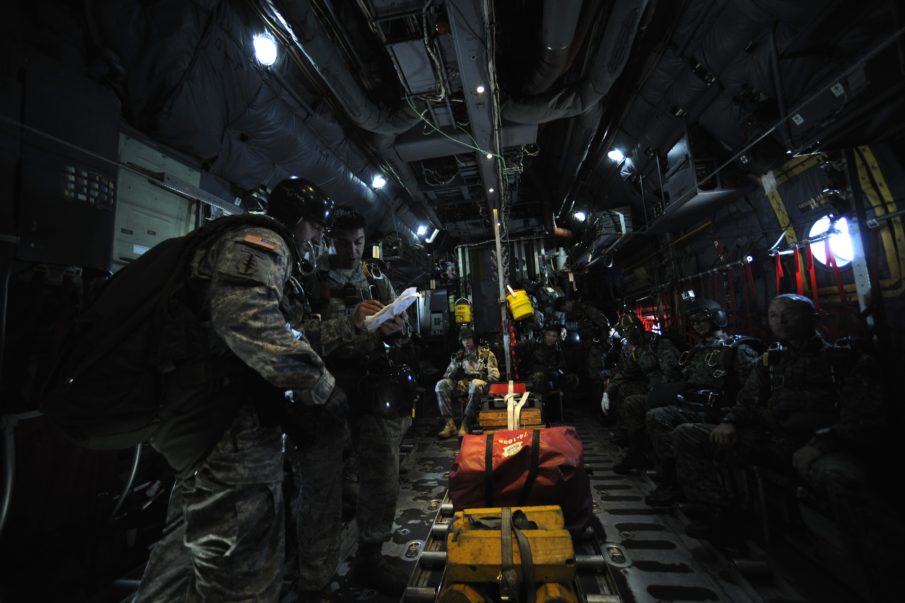Read Part 19 HERE
“I’ve worked with a lot of different nations and Korea is one of the best in Asia. Singaporeans are pretty good, Japanese are good, but Koreans are well structured, disciplined, and well equipped,” Tae said. With American help the damage caused by the war would be minimized however.
The North Korean threat has also evolved over time. While it has been long-expected that a war with the North would take place in a chemical warfare environment, today it would also take place in a nuclear environment. Instead of using tunnels like in the 1970s, an atomic blast could cut right through the defenses at the DMZ, creating a hole that North Korean forces could rush through. The acquisition of long-range ballistic missiles means that North Korea could launch attacks against US military installations on Japan and menace the Japanese civilian population. Seoul would certainly be flattened by a massive artillery barrage in the opening hours of the conflict.
If doomsday ever comes, Detachment K will serve as the command, control, and intelligence glue that holds the coalition together as SOCKOR’s only maneuver element in the field until Rangers, SEALs, and Special Forces ODA’s hit the ground days later. As the unit’s former Sergeant Major, Jack Hagan said that, “it is the sole shining example of what one Det can do if you let it do its mission.”
Colonel Maxwell described the Detachment’s legacy as:
The best alliance organization for ROK/US alliance and one of the best advisory organizations that we have ever created. The relationship between ROK Special Forces and US Special Operations Forces is very important and US Special Forces deserve a lot of credit for that. It speaks very well of our Special Forces NCOs who have a tremendous impact. You have Master Sergeants advising one star Generals in their doctrine and training. I think it is an excellent example of part of the glue that holds the alliance together. The legacy is how well trained the ROK Special Forces is which correlates with US/Korean SOF relationships going back 50 years.”
The success of South Korea cannot be attributed to the United States but rather to the tenacity and determination of the Korean people and yet, Detachment K played a low-key but important role in forming and maintaining America’s special relationship with Korea. For a unit that is only funded with 200 to 500 thousand dollars a year, the Detachment provides the maximum bang for the American taxpayer’s buck.
Former 3rd Special Forces Group Commander, Mark Boyatt has in the past advocated for having a Special Forces ODA working out of every US embassy where they would be that country’s resident team much like Detachment K. Dan Zahody believes that the detachment’s success could be replicated elsewhere. “We should expand this model to Taiwan. We should establish a SFDROC, Special Forces Detachment in the Republic of China,” Zahody said. US Special Forces started a resident detachment in Taiwan in 1960 but it was later disbanded.
But what of reunification? Will the day ever come when the detachment will no longer be needed? Unfortunately, a status quo prevails on all sides in which, “no one wants North Korea to fall because that would be such a financial burden on the surrounding countries,” Hagan explained. Colonel Maxwell holds out hope for reunification, but believes that it has to be planned for and anticipated in a deliberate manner, one which includes a robust information operation in order to condition the North Koreans for the shock of reunification. North Korean defectors have described how farmers in the North are growing and selling marijuana to the Chinese and how they also obtain South Korean DVDs from them. By watching South Korean soap operas and movies those living in the oppressive Kim regime are already learning the truth behind the big lie they have been sold.
Zahody said that, “North Korea has proven over and over again that they cannot be trusted and we must have a strong and good relationship with the ROK and our country. The long term model has to be that special relationship that will maintain democracy and keep the people free.”
Whether the future brings reunification or another Korean War, Detachment K stands ready. Every few years, the Kim family regime stirs things up and gets the North into international headlines, ratcheting tensions to their breaking point. This is largely a negotiation technique that builds political capital for North Korea to expand by asking for fuel and food over the winter months. If the North does decide to invade, or if the regime implodes from within, Korea’s resident team of Green Berets will be standing by with their comrades in the South Korean Special Forces Brigades.
The Special Forces mission is one of long-term relationships, patience, and team building. In recent years, American Special Forces have become obsessed with direct action, preferring the easy-to-define metrics of high value targets captured or killed to the ambiguous and murky world of unconventional warfare. If the United States government and Special Operations Command needs any further reason to understand by Special Forces is the venue that needs to be trained, funded, and employed in the field, they need look no further than Special Forces Detachment Korea.
(Lead image: A Det K member talks to AFSOC personnel prior to a jump, courtesy of the US Army)
Works cited:
Ahern, Thomas. “The Way We Do Things: Black Entry operations into North Vietnam.”
Burruss, L.H. “Mike Force.”
Cucullu, Gordon. “Separated at Birth.”
“Det-K: The First 50 Years.” Woody Woodfill and Chuck Randall.
Krause, Troy. “Countering North Korean Special Purpose Forces.”
Murphy, Jack. https://sofrep.com/7120/william-bowles-special-forces-sergeant-major/
Sawyer, Robert. “KMAG in Peace and War.”
Simpson, Charles. “Inside the Green Berets.”
Watts, Joe. “Korean Nights.”
Wong, Chester. “Yellow Green Beret.”
Yang, Wook. “No Mission is Impossible.” Special Ops Vol 21.
Young, James. “Eye on Korea.”










COMMENTS